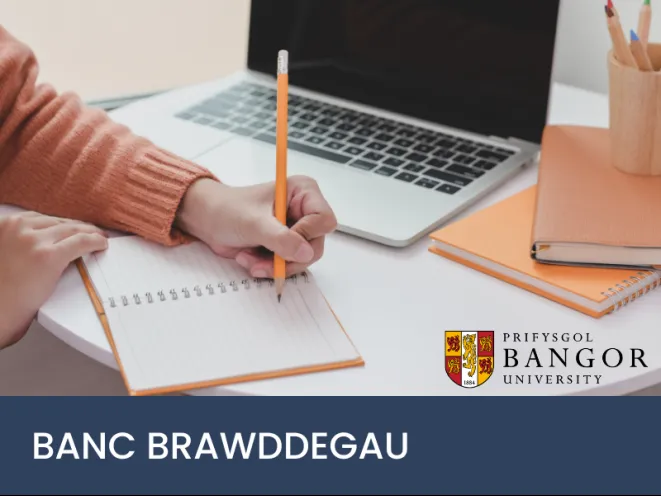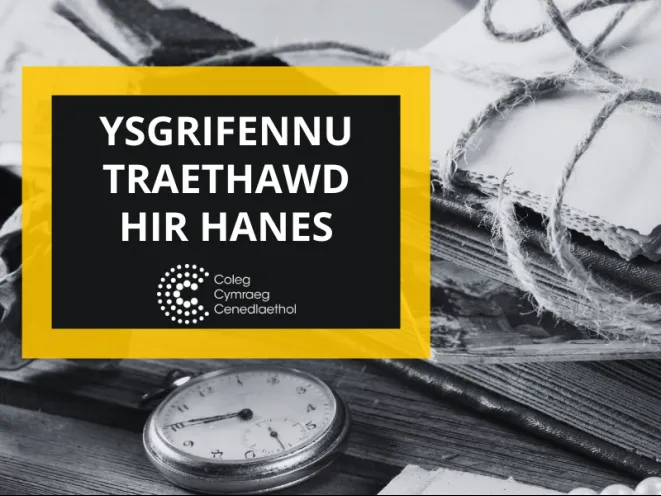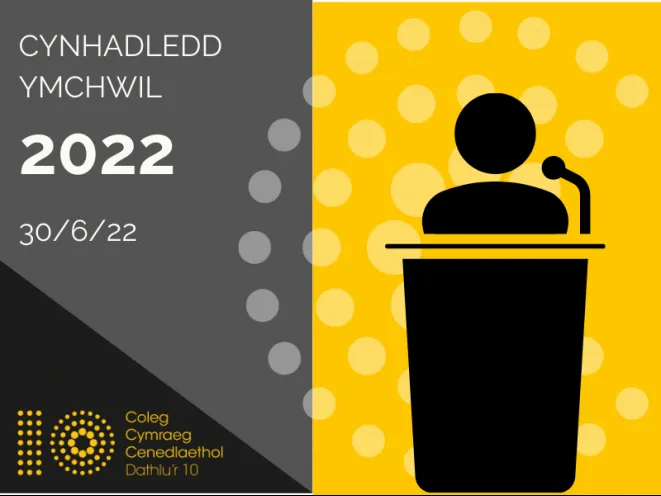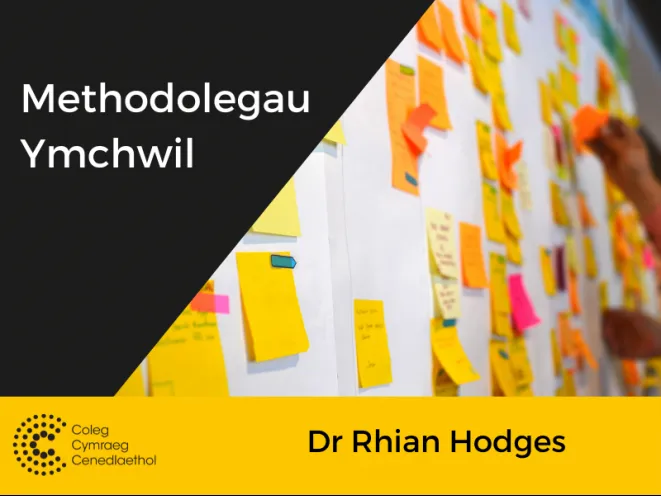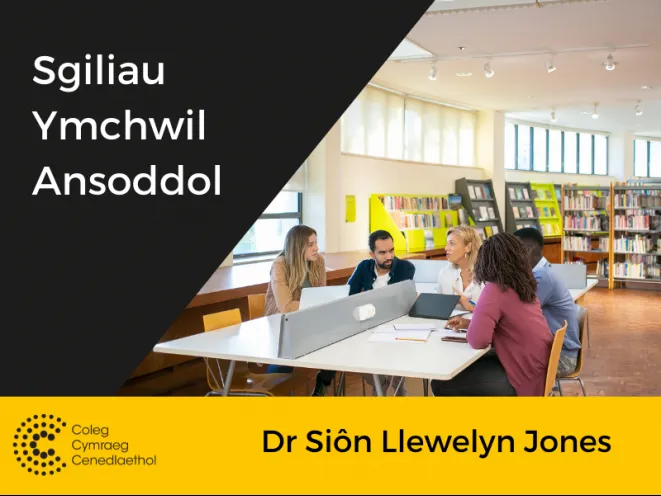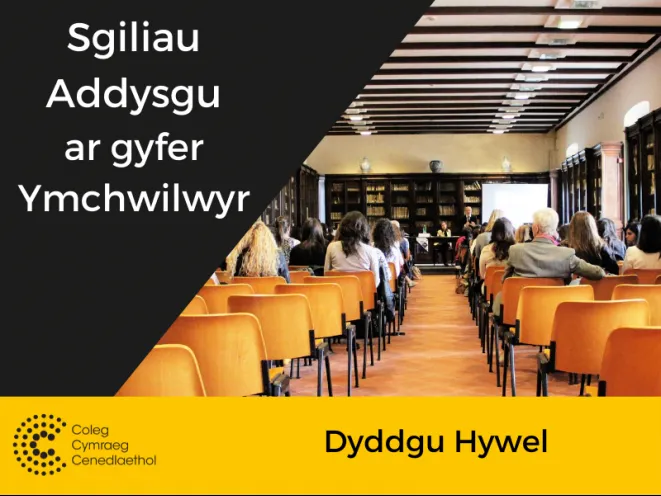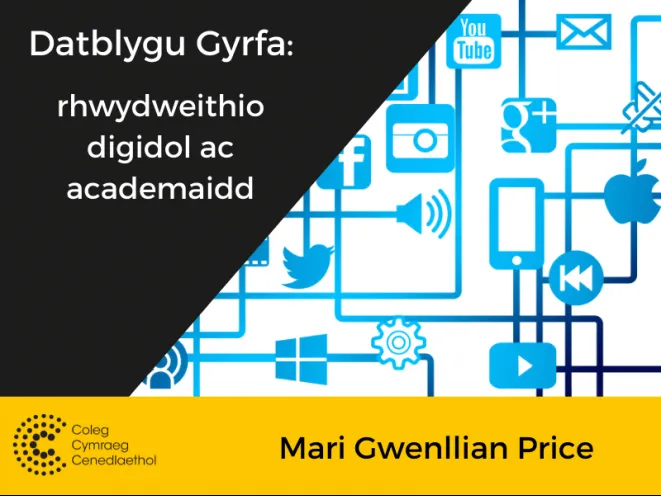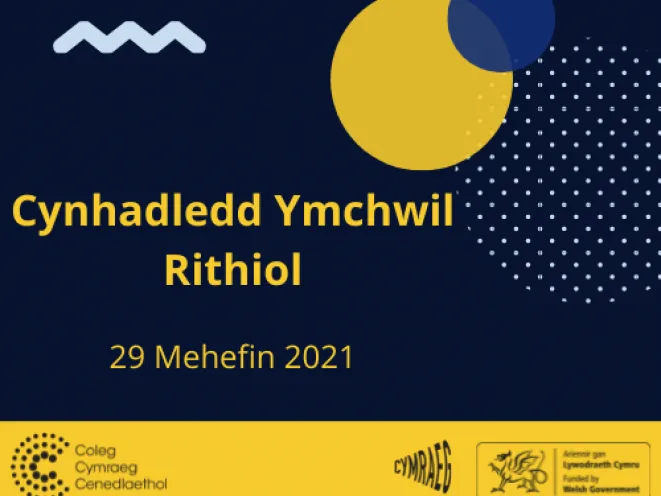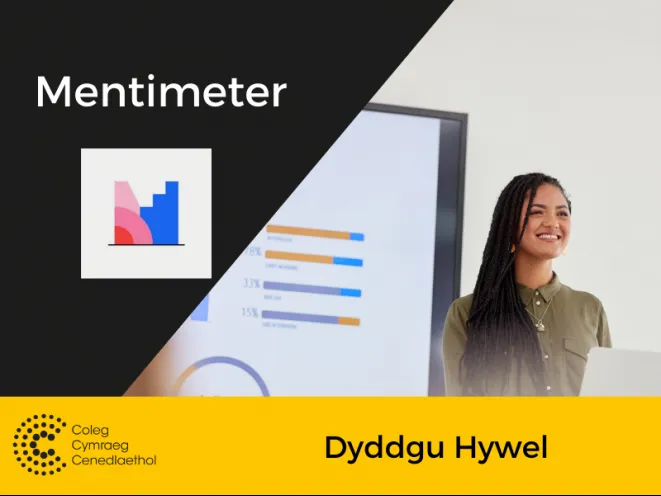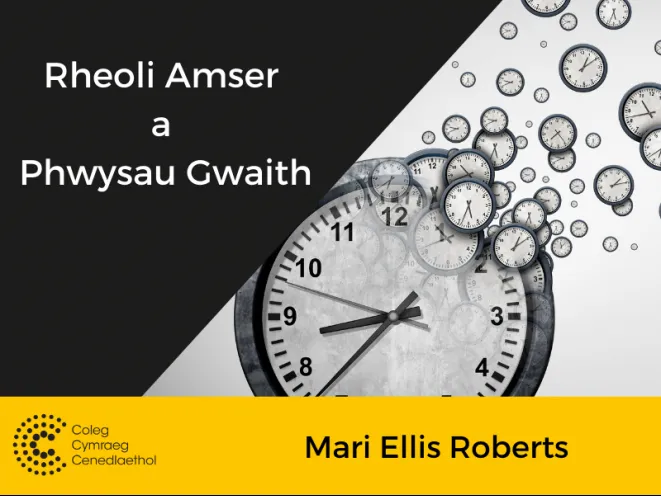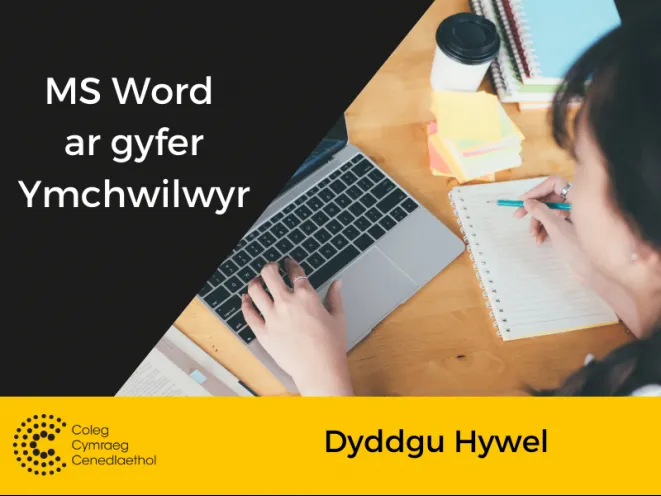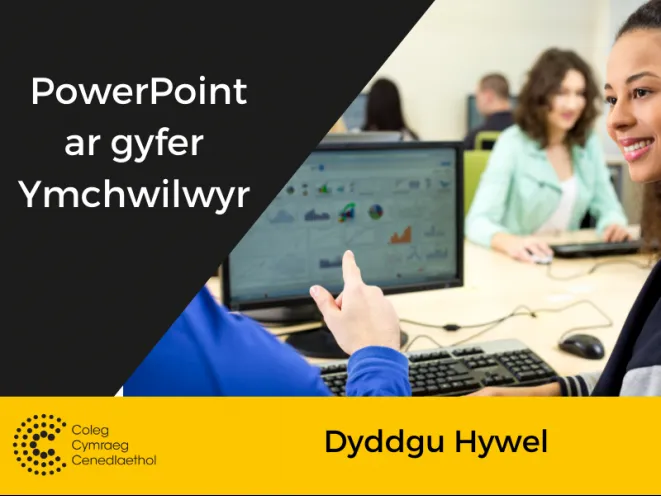Banc Brawddegau (Phrasebank) contains example phrases and sentences which can be used when writing a Welsh-medium essay, dissertation or academic paper. It is aimed at students and researchers, particularly those who may be new to Welsh-medium academic writing. Developed by Professor Enlli Thomas and Bethan Wyn Jones, Bangor University, based of Academic Phrasebank (https://www.phrasebank.manchester.ac.uk).
Traethawd Hir Hanes
Presentations on writing and researching for the History Dissertation module. What is a History Dissertation - Dr Lowri Ann Rees, Bangor University Researching Collections and Resources at the National Library of Wales online and at the Library The Medieval Age and Early Modern Period - Dr Rebecca Thomas, Cardiff University
Welsh-medium Research Conference 2022 (30 June 2022)
This Conference was held in a hybrid form this year, with an in-person audience at the National Library in Aberystwyth, and it was broadcast live to a virtual audience. The Coleg's annual Research Conference is for everyone who conducts and is interested in academic research through the medium of Welsh, whatever the field and whatever the discipline. Scientists, humanists and sociologists from all over Wales and beyond are invited to share the fruits of their research and to discuss with other like-minded Welsh researchers. The aim of the conference is to give the next generation of academics an opportunity to present their research before an audience of peers. The conference is also an opportunity to network with Welsh-speaking researchers and to foster a wider community of academics who promote Welsh-medium provision in our universities. Click below to see short presentations specially recorded for the conference. There are also links to view the research posters displayed during the conference. Recordings of the main presentations given live during the conference, and the question and answer sessions will be added below shortly.
Research Methodologies in the Arts and Humanities
The aims of these workshops is to: To introduce the main basics of Research Methods to postgraduate students with the following objectives: trace the history and origins of theories of research methodology; introduce the core concepts of research methods; offer various techniques of qualitative and quantitative research; key steps in creating a research plan. Content: These online workshops are split into three parts covering key research method concepts and key stages in creating a research plan. Part 1 - The purpose of social research: epistemology, ontology and empirical research; Part 2 - Research perspectives, strategies and questions Part 3 - Analyzing and interpreting data. Presenter: Dr Rhian Hodges Dr Rhian Hodges has been a Senior Lecturer in Sociology and Social Policy at the School of History, Law and Social Sciences at Bangor University for over a decade. She teaches Welsh-medium modules in education, sociology, language planning, sociology of music and research methods and loves teaching a wide range of different subjects through the medium of Welsh. Her specialist area of research is language planning, and in particular new Welsh speakers, community use of the Welsh language, and Welsh-medium education as a means of revitalizing the Welsh language in Wales. Originally from Bargoed, the Rhymney Valley, she has been living in Bangor for some time now. She's used to traveling up and down the A470 to see family and friends of the valleys. These workshops will benefit postgraduate students who are planning their dissertations and theses as it offers an opportunity to consider the critical stages of the research process and how it relates to their own research.
Qualitative Research Skills
The aims of these workshops is to: Introduce different types of qualitative methods Outline what needs to be considered before, during and after qualitative research is undertaken. Consider the ethical issues associated with qualitative research Outline how to analyse and present qualitative data. Content: Workshop 1 explores the different types of qualitative methods and creative methods. Workshop 2 looks at what needs to be considered when trying to access our research participants and before conducting the research. Workshop 3 focuses on what needs to be considered during and after conducting our research and the ethical issues associated with qualitative research. Workshop 4 looks at how to analyse and present qualitative data. Presenter: Dr Siôn Llewelyn Jones Siôn is a lecturer in the School of Social Sciences, Cardiff University. He has been developing Welsh-medium provision in the School and teaches on a number of modules, including research modules. Siôn has extensive experience of carrying out qualitative research. He has worked on a number of research projects for different organisations, such as the Children’s Commissioner of Wales, Public Health Wales and the Welsh Government. In 2017, he finished his PhD. For his doctoral research, Siôn explored the aspirations of young people attending a Welsh-medium and an English-medium school in the south Wales valleys. In these research projects, he was involved in their planning as well as interviewing participants and carrying out focus groups face to face, online and on the telephone
Workshop: Teaching Skills for Postgraduate students
Workshop objectives Professional knowledge – developing your knowledge of the subject you will teach Methodological information – an introduction to theory that underpins learning and teaching practices (learning styles) Group-specific dynamics skills – group dynamics, strategies for different situations Organizational knowledge – standards and regulations, rules and practices, norms and values. Content The online workshop will be split into four parts; Part 1: Understanding the personal traits of a high-quality tutor Part 2: Learning the key skills involved in planning teaching Part 3: Getting involved in a variety of teaching methods with smaller groups Part 4: Understanding some key principles relating to assessment. Presenter: Dyddgu Hywel Background Dyddgu studied a BSc (Hons) Design and Technology Secondary Education leading to Qualified Teacher Status' at Bangor University and she graduated with a first-class honors degree. She was a lecturer and A Level Design and Technology subject tutor at Coleg Meirion Dwyfor, before being appointed as a Design and Technology teacher at Ysgol Gyfun Rhydywaun. She is now working as a senior lecturer in Education at Cardiff Metropolitan University and has been there for over seven years. Her expertise lies in the effective use of teaching methods, student engagement and the use of technology enhanced learning. This workshop will benefit postgraduate students who are stepping into teaching for the first time and want to develop their teaching skills in front of a classroom and online teaching. This workshop will offer innovative teaching methods and boost their confidence in teaching.
Career Development: Digital and Academic Networking
Aims of this workshop: To introduce networking as a key skill for developing your career, and to offer advice and information about how to network within an academic and digital context. Content: During this workshop, we will look at what is networking and how to go about using your networks to help you to plan, research and develop your career. The workshop will explain how to use a number of different social media websites within a digital and academic context, and focus in particular on LinkedIn and how you can make the most of the site’s potential to help students and graduates. At the end of this workshop, participants should: Feel confident about developing and using academic and digital networks Understand the potential benefits that different social media sites offer in terms of career networking Create an effective LinkedIn profile and understand how to use the site effectively Presenter: Mari Gwenllian Price Mari has worked for the Employability Service at Bangor University for almost 10 years and offers careers advice and workshops within the academic curriculum as part of her role. She has also worked on work placement schemes within the University and is part of the team leading on the delivery of the Employability Award. Mari has completed an MA in Careers Advice and Guidance in Higher Education through Warwick University, and chose the career motivations of Welsh speaking students as her dissertation research topic.
Online Research Conference 2021
This conference, held on 29 June 2021, was for anyone who is interested in multi-disciplinery academic research through the medium of Welsh. Scientists, humanists and sociologists from all over Wales and beyond were invited to share the results of their research and to meet other like-minded Welsh researchers. The aim of the conference was to give the next generation of academics the opportunity to present their research to an audience of peers. There was also an opportunity to network with Welsh-speaking researchers and to foster a wider community of academics who promote Welsh-medium provision in our universities. Click below to see a recording of the live conference that includes question and answer sessions on each of the presentations. There are also links to a series of research posters.
Mentimeter
This is a workshop to get you started on using the Mentimeter website confidently in your teaching as a way of engaging with your students. www.mentimeter.com This workshop will benefit anyone who wants to develop and build on online teaching methods, innovative learning, online delivery and student engagement. Trainer background: This session is led by Dyddgu Hywel. Dyddgu studied BSc (Hons) Design and Technology Secondary Education leading to Qualified Teacher Status' at Bangor University, she graduated with first class honors. Her early career started as a Design and Technology A Level lecturer at Coleg Meirion Dwyfor, before being appointed as a Design and Technology teacher at Rhydywaun Comprehensive School. She’s now been working at Cardiff Metropolitan University for the last seven years, working as a senior lecturer in the School of Education, with her expertise in innovative teaching, student engagement and technology enhanced learning.
Managing your time and work pressure
At this uncertain time it can be a daunting task to manage time effectively. As many of us adjust to working remotely, while others learn to adapt to working in a different atmosphere on campus, time management can be challenging. This is a practical opportunity to review your personal style in terms of how you manage your work, people, administration, work-life balance and so on. Contents: Virtual working and managing various work pressures along with the challenges of care duties etc. have stretched most of us lately. This workshop will be an opportunity to think about these new pressures and the impact on our time, as well as an opportunity to consider ways of working more effectively both individually and as a team. At the end of this workshop trainees should be able to: • Identify problems and produce an action plan. • Identify patterns of procrastination. • Work better through effective planning and prioritising. • Make effective use of your diary/personal planner • Streamline/get rid of piles of paperwork and burdensome e-mails. • Make effective use of time with others. Mari Ellis Roberts Mari is a Human Resources Officer at Bangor University and is responsible for in-house Staff Development provision. She also manages the University's Motivation and Mentoring scheme and runs personal effectiveness workshops such as time management skills, effective goal setting etc.
MS Word for Researchers
This workshop will be helpful to anyone who wants to present information in alternative, and interactive ways, whether as part of a research presentation or in teaching. Workshop Objectives Develop a higher understanding of well-known software Taking Microsoft to another level Understanding that adopting simple techniques can lead to higher standard Managing the software so it works for you, and not 'captivating' Content Word: Create an interactive content page Useful tools with the Welsh language Translation tools Relevant equipment for referencing support At the end of this workshop, trainees should be able to: Create interactive presentations that look and work differently from the ordinary with confidence Understand extended techniques for creating projects, long essays and effective reporting Consider tying the elements of each project together in an interactive portfolio, and show confidence in this process Presenter: Dyddgu Hywel Dyddgu studied BSc (Hons) Design and Technology Secondary Education course leading to Qualified Teacher Status' at Bangor University, she graduated with a first-class honors. After three enjoyable years as a Design and Technology A Level tutor at Coleg Meirion Dwyfor, she was appointed as a Design and Technology teacher at Rhydywaun Comprehensive School. She’s now on her seventh year as a senior lecturer in Education at Cardiff Metropolitan University, and has been there for over seven years. Her expertise varies in the effective use of teaching methods, the use of technology, engagement and student health and well-being.
MS PowerPoint for Researchers
This workshop will be helpful to anyone who wants to present information in alternative, and interactive ways, whether as part of a research presentation or in teaching. Workshop Objectives Develop a higher understanding of well-known software Taking Microsoft to another level Understanding that adopting simple techniques can lead to higher standard Managing the software so it works for you, and not 'captivating' Content Design unique templates to suit your presentations Deliver innovative work Identification of new equipment outside the common tools Effective use of PowerPoint for multi-purpose At the end of this workshop, trainees should be able to: Create interactive presentations that look and work differently from the ordinary with confidence Understand extended techniques for creating projects, long essays and effective reporting Consider tying the elements of each project together in an interactive portfolio, and show confidence in this process Presenter: Dyddgu Hywel Dyddgu studied BSc (Hons) Design and Technology Secondary Education course leading to Qualified Teacher Status' at Bangor University, she graduated with a first-class honors. After three enjoyable years as a Design and Technology A Level tutor at Coleg Meirion Dwyfor, she was appointed as a Design and Technology teacher at Rhydywaun Comprehensive School. She’s now on her seventh year as a senior lecturer in Education at Cardiff Metropolitan University, and has been there for over seven years. Her expertise varies in the effective use of teaching methods, the use of technology, engagement and student health and well-being.

